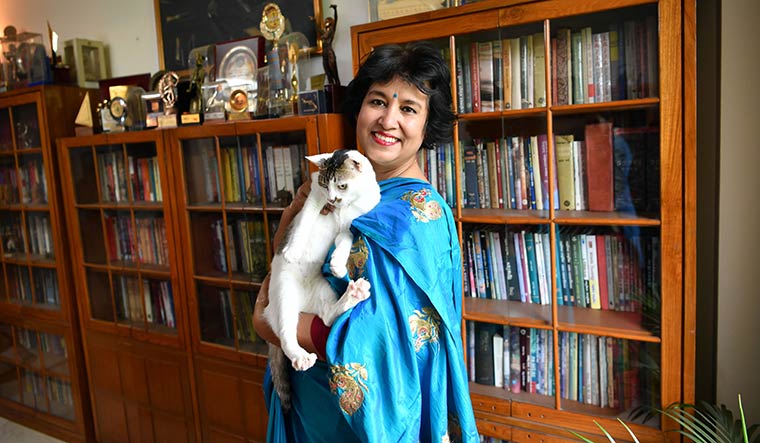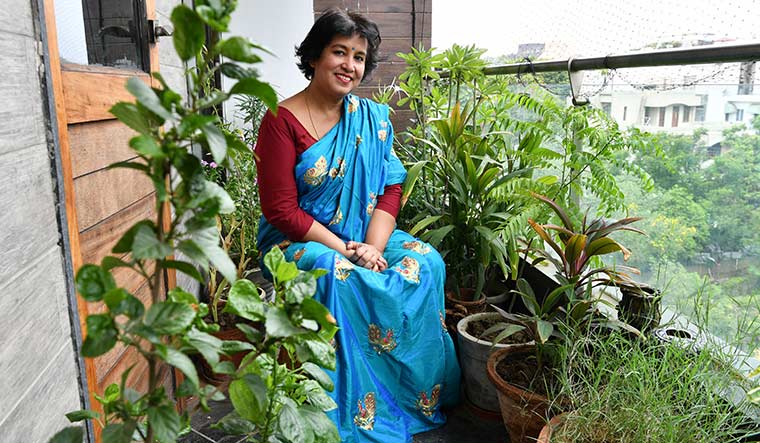It is an overcast Saturday in the capital. Taslima Nasreen potters around her home. A true Delhiwala, she has moved home more than once. Getting a flat was not easy. She had the money, but very few landlords want to make a point about literary freedom. For three years, she has been in this house, where, through the window, she gazes into the green—from the pale green gulmohar leaves to the darker neem. Nasreen is chattering with the gardener in Bangla to plant seeds. Language is her home, she says. Her tiny terrace is an explosion of plants—curry leaves, lilies, periwinkles and a potted palm—a sort of recreation of the garden of her childhood. “I only have plants that existed in my garden when I was growing up,’’ she says. “I collect them.’’
Twenty-five years an exile, Nasreen has not mellowed. She blazed on to the literary scene as a rebel. Her book was banned. Hers was, and is, a voice that refuses to be silenced. She has switched publishers though and is now with HarperCollins India. (Her new book—Shameless—will be out soon). Provocative, and often controversial, she has chosen to speak her mind, despite death threats. Perhaps, because of it. “I feel scared. But because of that, will I shut my mouth?’’ she asks. “It is not my fault. My opinions made fundamentalists furious. Lajja made the government furious. I blamed the government for not giving the minorities enough security. I was threatened. Cases were filed against me. I was thrown out of Bangladesh. Is it my fault or is it society’s? A writer should be free to write. A writer should feel safe. If I can’t express myself freely, then there is something wrong in the society.”
In India, Nasreen was asked to leave Bengal by the CPI(M). Under the United Progressive Alliance government, she was under house arrest. She has more fatwas in Bengal than in Bangladesh, yet India is where she has chosen to live since 2004. “Love for the country is sacrifice,’’ she says. “You forsake all other offers and luxury life and come here to live with pollution and worries. You don’t know whether you will get permission. It is love for the language, or the land.’’
Nasreen, who has an enviable European Union passport and an American green card, still struggles to live in India. During the interview, she gets a call about her residence permit. It was granted for a year, after she took to Twitter to question only a three-month extension. “After 25 years in exile, I am still worried about getting permission to stay,’’ she says. “Even though I am an European citizen, I settled in India—physically, psychologically and in every way. I have a cat. I got her from Kolkata; she is like my child.’’
Minu, the cat, has been her longest companion, from the tumultuous years of leaving Bengal to finally finding a home in a safe house in Delhi. In her new home, Minu has her own room, next to Nasreen’s. There are pictures of cats on her walls. Like her books that she has acquired during her stay in India, tucked in two cupboards, her possessions, including the quirky metal cat on her table, have the newness of the last decade. They lack history, they lack permanence, everything except Nasreen’s pictures from when she was younger and Minu.
“I found her in a fish market; she was this small,” she says, gesturing with her forefinger and thumb. “She was helpless and I didn’t think that I would take care of her. I just wanted to feed her. She is now 16.’’
Minu, too, has a connection to Nasreen’s childhood. Any cat she acquires—only cats, never dogs—is named Minu. “I had a cat when I was a teenager. I called her Minu,’’ she says, smiling. “In Sweden, I had a cat. I also named him Minu. He died. I cried so much and I decided to leave Sweden, because he died. I couldn’t tolerate it. I couldn’t live in the house where Minu was so happy running around. In Kolkata, I acquired another cat.’’
The lack of certainty, what with the extensions of visas in India, is compounded by the fear of losing Minu. The cat never travels. When Nasreen goes abroad, like she will soon, Minu is left at home with friends to be fed. With age now catching up to Minu, Nasreen knows it is only a matter of time. “Sometimes, she doesn’t eat. Cats cannot express their feelings. But I have to understand,” she says. “If she is happy and healthy, I am happy. She is still playful. Today, she will eat. Then she won’t eat tomorrow.”
This inevitability of loss hangs heavy. Over the years, members of her family have slipped away. “Only my sister is left,’’ says Nasreen. Her brother died recently. He was still young. “My aunt died; my grandmother died. I will fight for my right to go back to live in Bangladesh. But I won’t want to live there. It is risky and my loved ones are all dead,’’ she says.
Nasreen lives her life on the internet. If Twitter helped her get her visa extended, she also turns to it for simple joys. Instant and immediate are concepts she embraces. Her sari—a rich blue with peacock motifs—was delivered during the interview. Nasreen grabbed the packet, opened it and chose to wear the sari she bought online only yesterday. “It is wonderful,’’ she says, with evident awe.
Has exile changed her? For years, she longed to be home, but now she does not. She has become slightly more forgiving of her parents. “I was very anti my parents. But I realise now that maybe they both wanted me to be independent,’’ she says.
Is loneliness the price for exile? Or, for being outspoken? “I think [so] if you are different, if you have different opinions from the majority,’’ she says. “I demand equal rights. I demand a true secular society. I demand human rights for everyone. That kind of beautiful society, I dream of. So, of course, I should be alone. Anywhere, I would be alone. Because there are very few people who think like me.”
In the 25 years of exile, the sacrifice of her personal freedom for her thought, perhaps, is her biggest acceptance. “There are lots of things I cannot do,’’ she says. “If I go outside Delhi, I have to ask permission from the Delhi Police. But it is part of my life. I don’t think, ‘why can’t I get this much freedom?’ I can write. I can eat. I do not complain. I was supposed to be dead long ago. I am alive. As long as my health is fine and I continue writing and get published, I am happy.’’



